根据基本科学指标数据库(essential science indicators,简称esi)2024年7月11发布的最新数据显示(2024年7月11日更新,数据涵盖10年4个月:2014年 - 2024 年4月),本期共有9210家研究机构进入esi全球前百分之一,我校engineering工程学学科首次进入esi学科前1%。我校被web of science核心合集(sci/ssci数据库)收录的期刊,文献类型为article和review的论文1698篇,被引频次21347,篇均被引量为12.57,其中engineering工程学学科发文量为199篇,被引用3603次,篇均被引量为18.11。
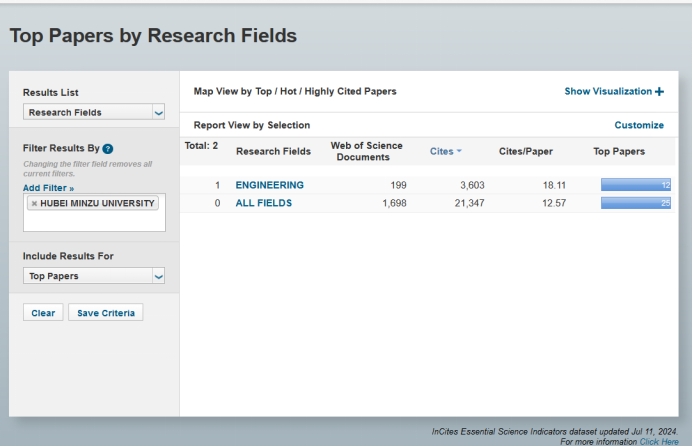
为了计算我校各学科与esi前 1%学科的差距,基于esi提供的学科阈值和incites提供的学科被引频次,给出被引量的相对位置的计算公式。在近似的时间下,被引量的相对位置=该学科的被引次数/入选该学科的阈值。(阈值指进入esi某学科排名前1%的最后一名机构的被引频次)。由于选取incites 数据集(incites 数据集更新于2024年6月28日。包含 web of science 标引内容 2024年5月31日)晚于esi数据涵盖数据范围2024年4月30日,实际发文量和引用量略有增加,会导致潜力值比实际略微偏高。因此,通过计算尽管computer science 计算机科学潜力值为1.0383大于1,尚未进入esi学科前1%,但是为我校下一个入围潜力学科。
本期我校esi学科分类数据来看,发文量最多的学科为chemistry化学274篇,引用量最高的学科为computer science 计算机科学5216,潜力值最高为1.0382。由于潜力值比实际略有偏高,尽管本期computer science 计算机科学潜力值大于1,该学科本期仍尚未进入esi学科前1%。
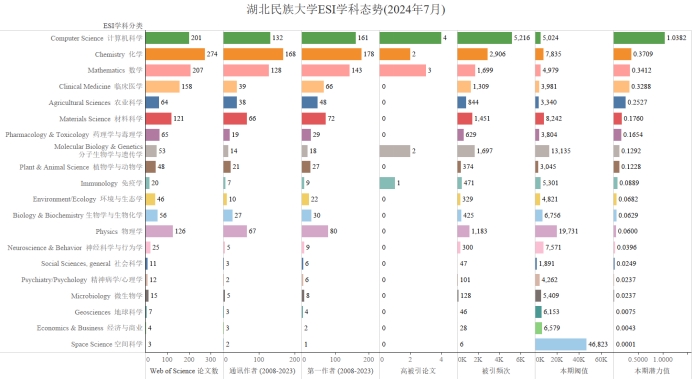
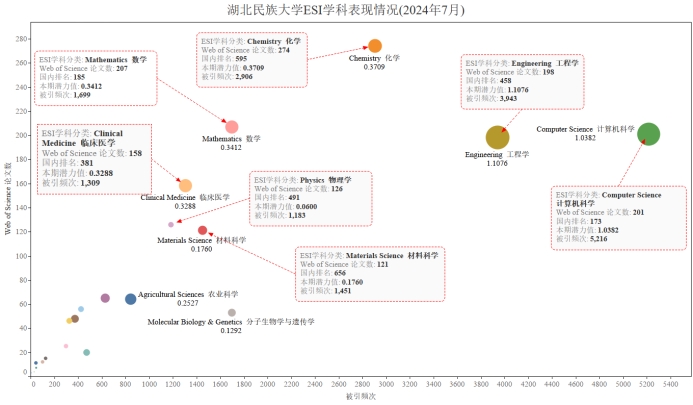
本期我校有望进入esi前1%的学科为computer science 计算机科学,潜力值为1.0382,论文数201,引用量5216,本期入围阈值5024。由于潜力值比实际略有偏高,从2024年第3期开始computer science 计算机科学学科潜力值已经大于1,但仍未入围esi学科前1%,为我校重点关注潜力学科。
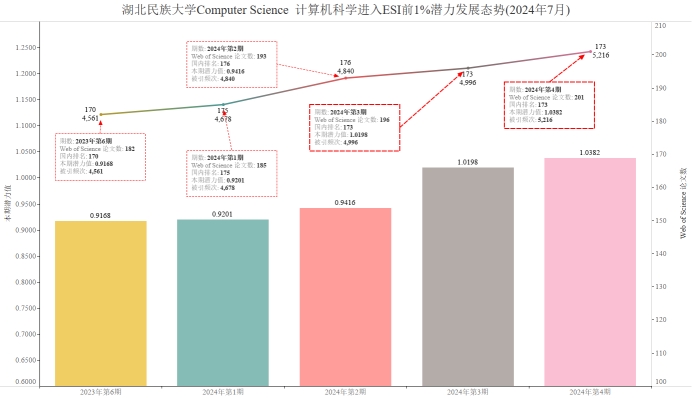
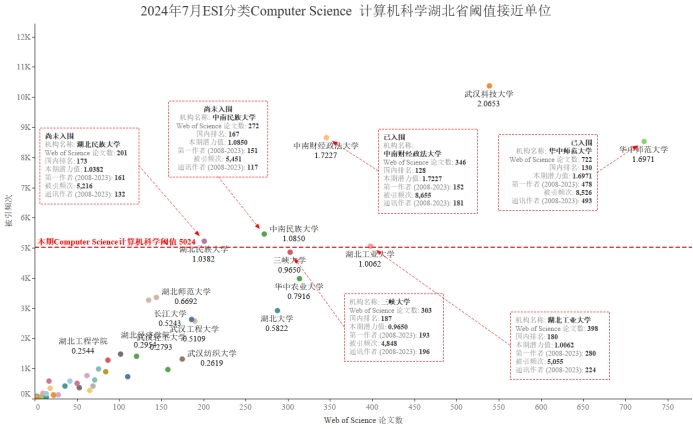
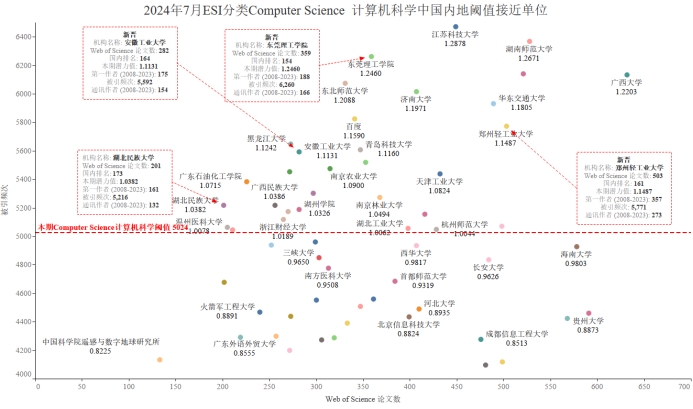
本期我校共有esi高被引论文25篇,热点论文0篇。高被引论文阈值是指近十年,某一esi学科某一出版年被引次数排在前1%的论文的最低被引频次,该被引频次为被scie、ssci和a&hci三个库中论文引用的数量。热点论文是指最近 2 年内,同年同学科被引频次在最近 2 个月内排名位于全球前0.1%的论文。
入藏号 |
论文标题 |
出版年 |
wos:001136745800004 |
long-term time series forecasting with multilinear trend fuzzy information granules for lstm in a periodic framework |
2024 |
wos:000952638800001 |
a three-way consensus model with regret theory under the framework of probabilistic linguistic term sets |
2023 |
wos:000920675000001 |
a sequential three-way decision-based group consensus method under probabilistic linguistic term sets |
2023 |
wos:000922875300002 |
three-way behavioral decision making with hesitant fuzzy information systems: survey and challenges |
2023 |
wos:001043156400023 |
a three-way decision methodology with regret theory via triangular fuzzy numbers in incomplete multiscale decision information systems |
2023 |
wos:001043156400027 |
a probabilistic linguistic three-way decision method with regret theory via fuzzy c-means clustering algorithm |
2023 |
wos:000965945000001 |
regret theory-based three-way decision method on incomplete multiscale decision information systems with interval fuzzy numbers |
2023 |
wos:000819827400009 |
a novel three-way decision model based on utility theory in incomplete fuzzy decision systems |
2022 |
wos:000893027500024 |
regret theory-based three-way decision model in hesitant fuzzy environments and its application to medical decision |
2022 |
wos:000614248900001 |
2d/2d black phosphorus/g-c3n4 s-scheme heterojunction photocatalysts for co2 reduction investigated using dft calculations |
2021 |
wos:000634564500025 |
single-atom ruthenium biomimetic enzyme for simultaneous electrochemical detection of dopamine and uric acid |
2021 |
wos:000579455200016 |
a novel fuzzy rough set model with fuzzy neighborhood operators |
2021 |
wos:000704125600005 |
three-way multiattribute decision-making based on outranking relations |
2021 |
wos:000624519700002 |
in-situ growth of few-layer graphene on zno with intimate interfacial contact for enhanced photocatalytic co2 reduction activity |
2021 |
wos:000686467300002 |
selenium-gpx4 axis protects follicular helper t cells from ferroptosis |
2021 |
wos:000488954600011 |
nonstationary l2 - l∞ filtering for markov switching repeated scalar nonlinear systems with randomly occurring nonlinearities |
2020 |
wos:000543396400009 |
association of blood glucose control and outcomes in patients with covid-19 and pre-existing type 2 diabetes |
2020 |
wos:000555970500006 |
in-hospital use of statins is associated with a reduced risk of mortality among individuals with covid-19 |
2020 |
wos:000452342700019 |
covering based multigranulation (i, t)-fuzzy rough set models and applications in multi-attribute group decision-making |
2019 |
wos:000454137400135 |
heterojunction engineering of mose2/mos2 with electronic modulation towards synergetic hydrogen evolution reaction and supercapacitance performance |
2019 |
wos:000481984300001 |
an event-based asynchronous approach to markov jump systems with hidden mode detections and missing measurements |
2019 |
wos:000464108900026 |
there is no diophantine quintuple |
2019 |
wos:000439363600002 |
a flexible terminal approach to sampled-data exponentially synchronization of markovian neural networks with time-varying delayed signals |
2018 |
wos:000424985400002 |
an asynchronous operation approach to event-triggered control for fuzzy markovian jump systems with general switching policies |
2018 |
wos:000341615100018 |
dual orlicz-brunn-minkowski theory |
2014 |





